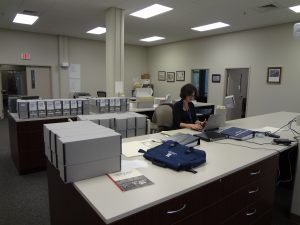The role of archives within an institution is a reflection of the organization’s values. Unlike the world of secular archives, Catholic religious’ archives have a mandate, that of Canon law, stipulating “all documents concerning the diocese or parishes must be kept with the greatest care” (Canon Law, cc 486). However, how each Catholic entity interprets and executes such directives varies greatly. . While religious community members can agree that archiving records of historic value is important to the legacy of the community, it becomes less clear where the necessary resources will come from to create and maintain such an endeavor. And the looming question remains…what becomes of the archives upon the closing or transitioning of the community?
However, the Sisters of Mercy are facing issues similar to the rest of religious communities, including, limited resources, and a future in transition. How do we Archivists advocate the allocation of such finite resources to our work, given those circumstances?
Currently, advocacy for the SOM archivists means not only educating key audiences on what archives is and how it functions, but how it is important to an organization beyond the “history”. To be relevant, we try to take advantage of every opportunity to educate the Community members, leadership, and staff on what it is we do and how it can serve the Institute. Beyond building credibility, we want them to understand that being an archivist requires specific education, training, and experience – a certain skillset and personality. One could argue it is a calling – a passion to preserve and relate the history of an institution. As the Sisters of Mercy evolve as a Community, so too, we hope the Mercy Archives can evolve to reflect the new reality.
As religious orders are faced with limited incoming membership and resources, where do Archives fit into that scenario? The upcoming working conference, “Envisioning the Future of Catholic Religious Archives” will attempt to have dialog around these issues and explore potential solutions, through the leaders, archivists, and historians of religious communities.
Kathryn Oosterhuis, MLIS
Director, Mercy Heritage Center
Belmont, NC
